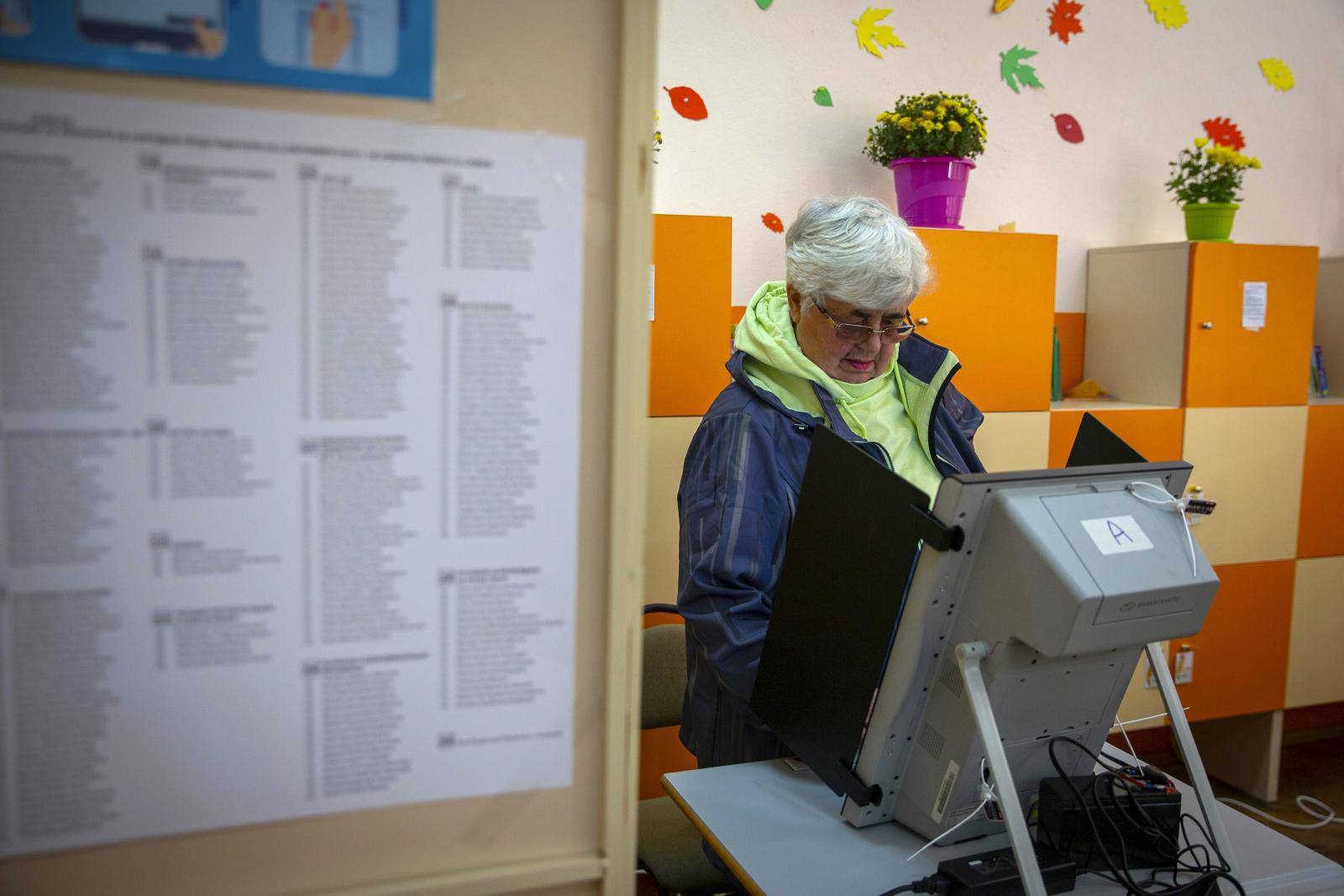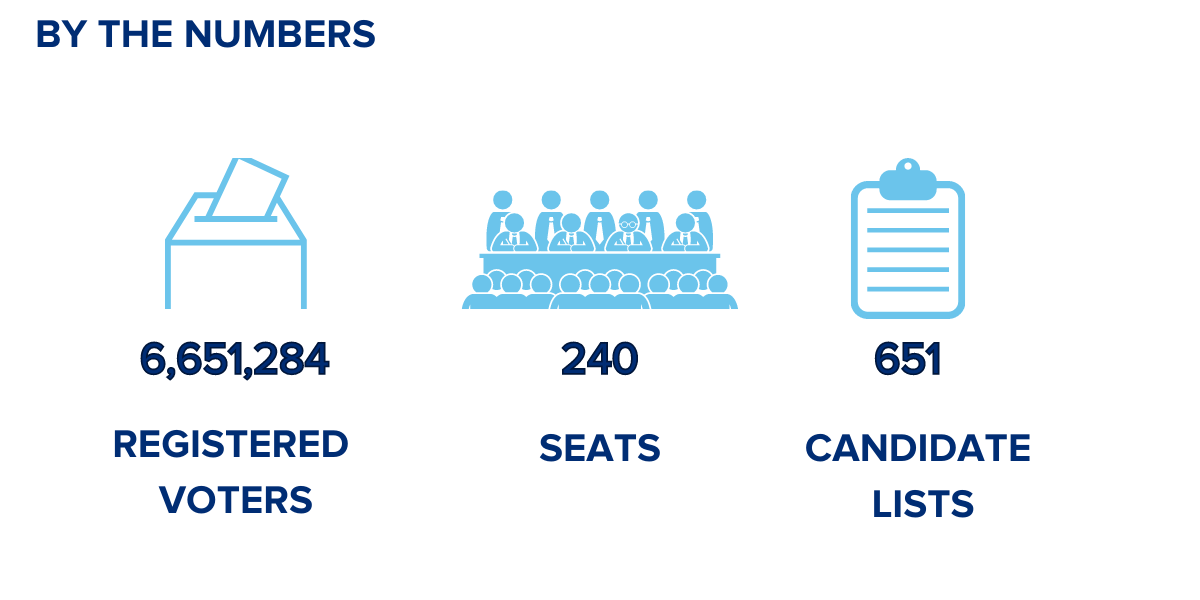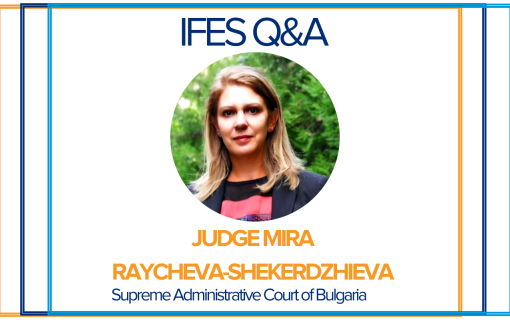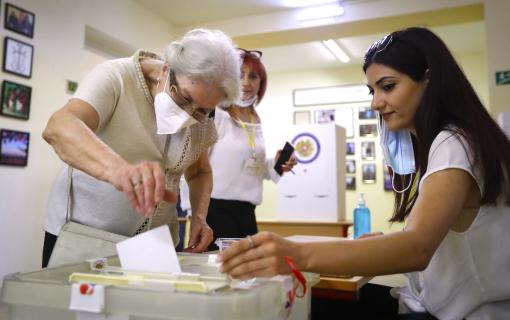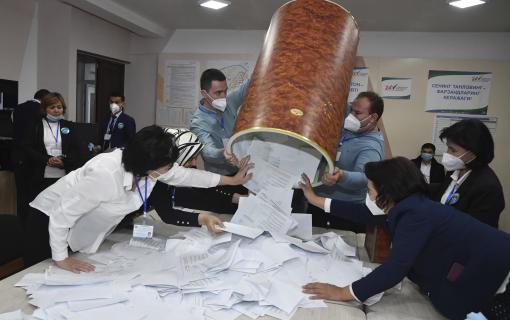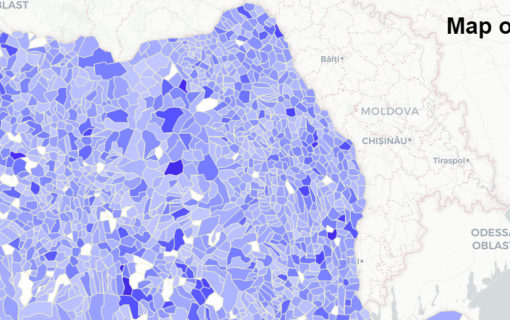Elections in Bulgaria: 2023 Parliamentary Elections
The Republic of Bulgaria will hold nationwide parliamentary elections on Sunday, April 2, 2023. They will be contested by 5,579 candidates on 651 registered candidate lists, with two independent candidates.
The parliamentary election, the fifth legislative election within two years, occurs amid ongoing political turmoil in Bulgaria. This election follows four others in which no party could secure an electoral majority or build a sustainable governing coalition. Without a majority or a stable coalition, President Rumen Radev has appointed a succession of caretaker governments, including the current government led by interim Prime Minister Galab Donev. The lack of a stable government has resulted in parliamentary gridlock, with parties unable to advance their policy priorities or implement much-needed reforms to address widespread concerns about corruption.
Ahead of this important electoral process, the International Foundation for Electoral Systems (IFES) provides Frequently Asked Questions on Elections in Bulgaria: 2023 Snap Parliamentary Elections.
Learn more about IFES's programs in Bulgaria and follow @IFES_Europe and @IFES1987 on Twitter.
Additionally, visit IFES's Election Guide for the most comprehensive and timely verified election information available online.
Frequently Asked Questions (FAQs)
The Republic of Bulgaria will hold nationwide parliamentary elections on Sunday, April 2, 2023. Voting will take place from 7 a.m. to 8 p.m. at 11,819 polling stations throughout Bulgaria and at designated voting stations abroad. If any voters are waiting at polling stations at 8 p.m., officials may extend the voting period to 9 p.m. for those present at the stations. Voters in medical and detention facilities or aboard Bulgarian naval vessels will also be able to cast their ballots during the same time.
April’s parliamentary election, the fifth legislative election in two years starting in April 2021, occurs amid ongoing political turmoil in Bulgaria. This election follows four others (April 2021, July 2021, November 2021, and October 2022) in which no party could secure an electoral majority or build a sustainable governing coalition. Without a majority or a stable coalition, President Rumen Radev has appointed a succession of caretaker governments, including the current government led by interim Prime Minister Galab Donev.
The lack of a stable government has resulted in parliamentary gridlock, with parties unable to advance their policy priorities or implement much-needed reforms to address widespread concerns about corruption. Senior European Union officials have cited the country’s inability to form a government and tackle corruption and inflation as a specific concern, and the political situation increasingly threatens to derail Bulgaria’s accession to the Eurozone. The election also will raise questions about Bulgaria’s precarious balancing act between the West and Russia; President Radev and interim Prime Minister Donev are widely seen as pro-Kremlin, while Citizens for European Development of Bulgaria, Bulgaria’s ruling party from 2009 to the outset of the parliamentary deadlock in 2021 and the leading party in most pre-election polls, is pro-West.
The elections may also seriously affect Bulgarians’ confidence in their country’s democratic future. The succession of snap elections has seen public engagement plummet, with voter turnout plunging from 52.7 percent in 2017 to 39 percent in October 2022—the lowest since Bulgaria held its first post-communist elections in 1990. Recent surveys by the Centre for Liberal Strategies in Bulgaria also found increasing distrust among citizens toward political parties and growing disillusionment with politics in general.
The April 2 snap parliamentary elections will be contested by 5,579 candidates on 651 registered candidate lists. Two additional candidates are running as independents. As of February 28, the official deadline for party or coalition registration, the Central Election Commission had registered 15 political parties and seven coalitions.
Voters may choose not to support any candidate by selecting a “none of the above” option. This choice will be counted when calculating turnout but has no impact on the distribution of seats in the National Assembly.
In Bulgaria, national representatives are elected through a proportional representation system, designated by party, coalition, and nomination committee candidate lists. Early parliamentary elections are primarily regulated by the 1991 Constitution, the 2014 Election Code, and the 2005 Political Parties Act, supplemented by decisions of the Central Election Commission. The current 48th National Assembly has 240 seats, and representatives are elected for four-year terms. Seats are allocated through a single preference option in 31 multi-member constituencies established by population size, ranging from a minimum of four to as many as 16 seats in a constituency. To claim a seat in the National Assembly, parties and coalitions must receive at least 4 percent of valid votes cast.
Any citizen over 21 has the right to run for office as long as they do not hold citizenship in another country, are not serving a prison sentence, and have not been deemed incompetent by a court due to disability. Active military personnel, diplomats, and employees of certain ministries and agencies cannot run on behalf of a political party or coalition but may run as independent candidates.
To register, parties and coalitions must deliver a deposit of 2,500 BGN ($1,512) into a designated account at the Bulgarian National Bank, as provided by the Central Election Commission (CEC); nomination committees must deposit 100 BGN ($60.48). Parties and coalitions must register with the CEC, submitting the signatures of at least 2,500 voters; nomination committees must register within the designated constituency election commission; and independent candidates must submit the signatures of at least 1,000 voters.
The National Audit Office oversees campaign finance, which the Election Code regulates, the Law on Political Parties, and the State Budget Act. Under these regulations, parties that received between 1 and 4 percent of votes nationwide in the previous election are eligible to receive public funding of BGN 8 ($4.84) per valid vote received.
For National Assembly elections, the expenditure limit is BGN 3 million ($1.8 million) for a party or coalition and BGN 200,000 ($120,964) for independent candidates.18 Although candidates are not required to disclose campaign expenditures before Election Day, a candidate’s nominating entity must submit a report on revenues, expenditures, and commitments for payments within 30 working days following the election.
Parties that do not otherwise receive state funding are provided BGN 40,000 ($24,192) to spend on paid media advertisements, and nomination committees receive BGN 5,000 ($3,024). A political party or coalition may finance its campaign through its own or candidates’ resources and those of legal entities and sole traders, provided its methods comply with Election Code regulations.
As of 2019, there is no donation limit following amendments to Bulgarian campaign finance law; the same amendments reduced public funding for parties to compensate and permitted donations from legal entities. Nonresidents, religious institutions, and foreign states are prohibited from contributing to parties or campaigns.
Bulgaria has a tiered election management system with three primary levels of election management bodies (EMBs): the Central Election Commission (CEC), 31 district (or constituency) election commissions (DECs), and precinct election commissions (PECs). PECs will be appointed to administer polls at 11,823 regular polling stations. In addition, section election commissions and mobile election commissions oversee specific voting sections in Bulgaria.
The CEC is the only permanent EMB in Bulgaria. It is defined in the country’s election code as an independent body that is responsible for conducting and administering elections. In line with changes to the electoral code approved by the National Assembly, the CEC was reduced from 20 members to 15 members in May 2021. Members of all levels of election commissions, including EMB leadership, are appointed following nomination by political entities in proportion to representation in the National Assembly. The most recent appointments took place following the July 2021 parliamentary elections. CEC members hold five-year terms, which they may leave early only through resignation or if they are removed for violating the rules of their appointment.
According to the Election Code of the Republic of Bulgaria, the duties of the CEC include:
- Implementing activities in line with the Election Code;
- Guiding the operation of and appointing lower-level election commissions;
- Registering parties, coalitions, and candidate lists for elections;
- Establishing terms and procedures for election observers;
- Determining the locations of voting sections abroad;
- Overseeing the conduct of the election campaign;
- Examining all complaints regarding election irregularities; and
- Processing and publishing election results.
The public can view CEC meetings via livestream or on the CEC website, and certain outside observers may attend meetings in person. The CEC also receives input from a public council composed of representatives of Bulgarian civil society.
CEC members appoint and train DEC members, who are nominated by political parties and coalitions based on the composition of the respective constituency, or by the CEC if no consensus is reached. DECs, in turn, nominate members of PECs. The number of members of a DEC reflects the district‘s size. Like the CEC, each DEC is led by a chairperson; however, DECs may not have a single-party majority. Once appointed, members of DECs have authority until two weeks after the election ends. Many powers, functions, and checks established for the CEC are the same at the district level. The functions of PECs are similar to those of DECs and the CEC, but at the polling station level; PECs administer voting processes on Election Day.
Under the Constitution of Bulgaria, every citizen above 18, except those serving a prison sentence or those deemed incompetent by a court due to disability, has the right to vote. There is no permanent voter register; before each election, the Ministry of Regional Development and Public Works compiles information about eligible voters from the National Population Register into an electoral roll it provides to the Central Election Commission.
The executive leadership of medical or detention facilities, specialized social services institutions, and Bulgarian naval vessels are responsible for compiling additional electoral rolls and providing them to relevant municipal administrations; voters can cast their ballots so long as there are 10 or more eligible voters in these locations.
For voting abroad, the heads of Bulgaria’s diplomatic missions and consular posts compile voter lists consisting of the voters' names and the polling stations' numbers and addresses, which are then shared with the Ministry of Foreign Affairs and published no later than 18 days before Election Day. Voters abroad may vote at any diplomatic mission or consular post voting section upon presentation of Bulgarian identification. According to data from the Central Election Commission, there will be 6,651,284 registered voters for the April 2, 2023 parliamentary elections.
Bulgarian law does not include measures to promote the participation of women, nor does it require the publication of gender balances for each party’s candidate list. It prohibits the formation of political parties along ethnic, racial, or religious lines, and there are no quotas for gender or national minority representation on candidate lists. While the Constitution prohibits discrimination on ethnic or religious grounds and guarantees the right to self-identification, it makes no reference to national minorities, and campaigns may only be conducted in the Bulgarian language.
The Election Code includes provisions to protect the rights of persons with disabilities. At least seven days before Election Day, the relevant election management bodies must announce the measures in place to help voters with ambulatory difficulties or visual impairments vote. Bulgaria’s Election Code has specific requirements designed to ensure accessibility—for example, requiring that polling stations have a designated voting section on the ground floor and that polling booths are wide enough to accommodate those with ambulatory difficulties. Voters with permanent disabilities who are unable to access their polling sites may receive a visit from a mobile polling team on Election Day, provided they submit the proper paperwork at least 14 days before the election; they may also vote at any polling station of their choice and do not need to submit a request beforehand. A voter with visual or motor impairments may be assisted by an attendant designated by the voter, subject to approval by the chair of the Precinct Election Commission. To help spread awareness of these provisions and the options available to persons with disabilities, the Central Election Commission has provided informational videos on accessibility measures through its website.
Per the Election Code, observers must register with the Central Election Commission (CEC) to conduct observation activities. The law allows observers to register up until Election Day. Election monitors from Bulgarian civil society and international observers must submit confirmation and authorization of their legal status; the CEC will then publish a list of officially accredited observers on its website. As of March 15, according to the CEC, three international organizations—the Organization for Security and Co-operation in Europe’s Office for Democratic Institutions and Human Rights (OSCE/ODIHR), the Parliamentary Assembly of the Black Sea Economic Cooperation, and the Parliamentary Assembly of the Council of Europe—and 16 local nongovernmental organizations were registered to observe the election. OSCE/ODIHR deployed 14 long-term observers in Bulgaria ahead of the election, with 200 additional short-term observers requested from participating states to observe on Election Day.
The Central Election Commission (CEC) must announce the allocation of seats to parties and coalitions no later than four days after Election Day, in this case, by 8 p.m. on April 6, 2023. The names of the elected national representatives must be announced no later than seven days after Election Day, in this case, by April 9, 2023. After the election, the CEC will create a publicly accessible voting data database and use specialized software to compare results and document discrepancies.
Following the election, the President has up to one month from Election Day to convene the National Assembly; should the President fail to do so, the Assembly may be convened instead by at least one-fifth of the Assembly’s members. The President is also charged with appointing the Prime Minister, who is nominated by the party holding the highest number of seats in the Assembly. Should the Prime Minister-designate fail to form a government within seven days of their appointment, this mandate then passes to the second-largest party in the Assembly; should the second Prime Minister-designate fail to form a government within seven days, the President may select one of the smaller parties to present a nominee. Should there continue to be no agreement on the formation of a government, the President must appoint a caretaker government, dissolve the National Assembly, and schedule elections within two months of the expiration of the National Assembly’s term.
Voters, domestic observers, political parties, and candidates’ representatives can file complaints and appeals. The decisions of election commissions can be raised to the next highest commission following appeals procedures. Depending on the issue, complaints may be raised to local administrative courts and finally to the Supreme Administrative Court. A registry of election disputes and appeals is maintained in a public registry by the Central Election Commission and District Election Commissions.
The International Foundation for Electoral Systems (IFES) has partnered with the Bulgarian Institute for Legal Initiatives in implementing the Effective Combat Against Corruption project, funded by the U.S. Department of State’s Bureau for International Narcotics and Law Enforcement. The project focuses on preventing the abuse of state resources in elections and improving training for auditors and political party financial managers in coordination with the National Audit Office. The project also works to clarify the criteria for judicial remuneration in cooperation with the Supreme Judicial Council and to strengthen judicial mentorship programs and judicial ethics training in coordination with the National Institute of Justice.
Through IFES’s Regional Europe program, funded by the United States Agency for International Development, Bulgarian election professionals and civil society actors are also engaged in numerous activities designed to support democratic resilience, primarily related to cybersecurity, information integrity, and anti-corruption.
These FAQs reflect decisions made by the Bulgarian Central Electoral Commission as of March 27, 2023, to the best of our knowledge. This document does not represent any International Foundation for Electoral Systems policy or technical recommendations.




